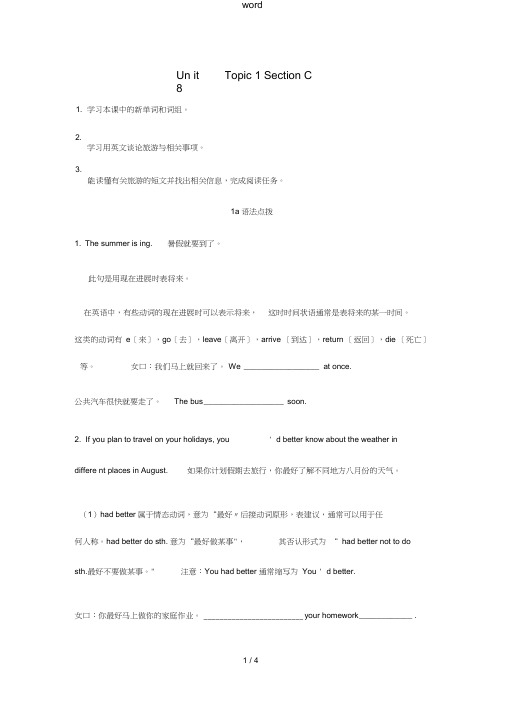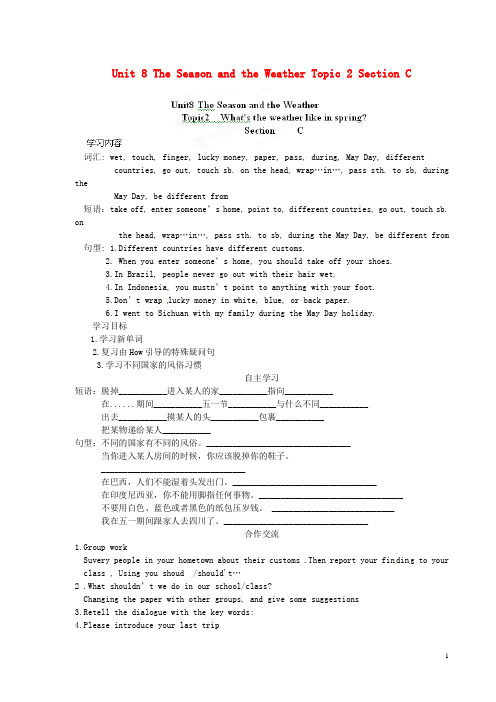七年级英语下册 Unit 8 The Seasons and the Weather Topic 1同步辅导 仁爱版
海南省海口市第十四中学七年级英语下册 Unit 8 The Season and the Weath

Unit 8 The Season and the Weather Topic 1【学习目标】:1.能够用英语简单地讨论天气; 2.能够谈论自己所喜欢的季节自主预习:1. 同学们要会读、会写下面的单词(由小组长教读两遍后,各组员自主朗读并记忆,最后由小组长组织听写)一年四季:春季____________夏季___________秋季______________ 冬季_____________天气气候:天气______________ 暖和的____________热的、拉的 _____________冷的、感冒_______________下雨、雨 _____________下雪、雪 _____________季节 ______________2.预习教材77页 1a以及78页3a对话,注意下面的短语和句子:对天气提问:What’s the weather like spring?(在____________________前用介词in)(同义句) is the weather in spring?回答用:It’s+表天气气候的词这是做……的好……的两种句型:It’s a good season flying kites.It’s a good time climb hills.上面两句的句型结构_____________________________________________去游泳 __________________ 堆雪人 ___________________放风筝 ___________________爬山 ____________________很难说 ___________________学习做某事____________________对最喜欢季节的提问: your favorite season?Which season do you like ?(你们都做对了吗?找老师或同学核对下吧。
七年级英语下册 Unit 8 The Seasons and the Weather句式精讲精练 (

本文档仅供文库使用。
百度文库是百度发布的供网友在线分享文档的平台。
百度文库的文档由百度用户上传,需要经过百度的审核才能发布,百度自身不编辑或修改用户上传的文档内容。
网友可以在线阅读和下载这些文档。
百度文库的文档包括教学资料、考试题库、专业资料、公文写作、法律文件等多个领域的资料。
百度用户上传文档可以得到一定的积分,下载有标价的文档则需要消耗积分。
当前平台支持主流的doc(.docx)、.ppt(.pptx)、.xls(.xlsx)、.pot、.pps、.vsd、.rtf、.wps、.et、.dps、.pdf、.txt 文件格式。
Unit 8 The Seasons and theWeather句式精讲精练【句式精讲】1.How is the weather in winter?此句型是用来询问天气的句型,类似的还有:What’s the weather like?如果要询问某地的天气情况,常用What’s the weather like in…?或How’s the weather in…?其中介词in后跟表示地点的名词。
对这些句型的回答常用“It is…”或“The we ather is…”,is后跟描述天气状况的形容词或动词-ing形式,其中描述天气状况的形容词可以是warm; hot; cool; cold等表示冷暖的词,也可以是sunny; rainy; windy; cloudy; snowy等表示天气的词。
例如:—What’s the weather like in Beijing? 北京的天气怎么样?—It’s cloudy. / It’s cool. / It’s raining. 多云。
/ 凉爽。
/ 正在下雨。
2.Which season do you like best?句式“like…best”,意为“最喜欢的是……”,是用于描述个人喜好的句式,与“one’s favorite… is+名词”为同意句式。
仁爱英语七年级下册Unit 8 The Seasons and the Weather.知识点讲解

Unit 8 The Seasons and the WeatherTopic 1 what’s the weather like in summer?Section A1. What's the weather like in spring?春天天气怎么样?"What's the weather like ...?”是用来询问天气状况的句型||。
还可以用“How’s the weather...?"来表达||。
如:-What's the weather like there in winter? =How's the weather there in winter? 那里冬天天气怎么样?-It often snows.常常下雪||。
2. It's a good time to climb hills.这是登山的好时节||。
句型“It+be+名词/形容词+to do/for doing sth.”意为“这/那是做某事的……”||。
如: It is a good season for hiking.这是徒步旅行的好季节||。
It is hard to say.这难说||。
3. --why? 为什么?--because I learned to swim last year||,….因为我去年学了游泳||,…(1) Why? 的完整句子应为Why do you like summer best?(2 ) learn to do sth.意为“学会做某事(未做)||。
如:Judy is learning to dance.朱迪在学跳舞||。
4. When it snows||,I can make snowmen.下雪时我可以堆雪人||。
Snow v.意为“下雪”||。
如:It snowed last night.昨晚下了一场大雪||。
snow n. 意为“雪”||,不可数名词||。
福建省武夷山市七年级英语下册《Unit 8 The Seasons and the Weathe

(你知道上面日历图片展示的是哪些节日的日期吗?请把序号填到横线上。)
2011
9月10日
2011
12月25日
2011
11月24日
星期四
2011
12月31日
十二月初七
2011
1月23日
正月初一
2011
2月6日
正月十五
_______ ________ ________ _________ _______ _______
【盘点收获】
我今天学到了好多节日名称:_________________________________________________
_______________________________________________________________________
_______________________________________________________________________
People in many countries celebrate Christmas and give each other presents.
On Lantern Festival, people eat sweet dumplings for good luck.
On Thanksgiving, many people eat turkey and pumpkin pie.
我今天学到的新单词有:_______________________________________________________________________
_______________________________________________________________________
七年级英语下册Unit8TheseasonsandtheWeatherTopic1What’sthe

能读懂有关旅游的短文并找出相关信息,完成阅读任务。
1a 语法点拨1. The summer is ing. 暑假就要到了。
此句是用现在进展时表将来。
在英语中,有些动词的现在进展时可以表示将来, 这时时间状语通常是表将来的某一时间。
这类的动词有 e 〔来〕,go 〔去〕,leave 〔离开〕,arrive 〔到达〕,return 〔返回〕,die 〔死亡〕等。
女口:我们马上就回来了。
We _________________ at once.公共汽车很快就要走了。
The bus __________________ soon.2. If you plan to travel on your holidays, you ' d better know about the weather in differe nt places in August. 如果你计划假期去旅行,你最好了解不同地方八月份的天气。
(1)had better 属于情态动词,意为“最好〃后接动词原形,表建议,通常可以用于任何人称。
had better do sth. 意为“最好做某事", 其否认形式为 “ had better not to do sth.最好不要做某事。
" 注意:You had better 通常缩写为 You ' d better.女口:你最好马上做你的家庭作业。
_________________________ your homework ____________ .1. Un it 8 Topic 1 Section C学习本课中的新单词和词组。
2.3.学习用英文谈论旅游与相关事项。
你们最好不要外出因为外面正下大雨。
_____ because it is __________________ outside.(2) plan to do sth. 计划做某事;knowabout 了解;in different places 在不同的地方3. It ' s the best time to go there..... the best time to do sth.如:早晨是读英语的最优时间。
福建省武夷山市七年级英语下册《Unit 8 The Seasons and the Weathe

4.昆明是一个你随时可去的春城。
Kunmingis aSpringCitythat you can _________ ___________.
5.别忘了给我买一副太阳镜。
Don’t forget to buy me ______ ________ ________ ___________.
___________________________________________________________________________
___________________________________________________________________________
2.I wish _______ (fly) to the moon.
3.My father plans ________ (move) toShanghai.
4.Kangkang would like ________ (visit) Quangzhou.
5.She hopes _______ (have) a birthday party.
展示提升
根据3a的问题提示,写一篇有关旅游计划的作文。
___________________________________________________________________________
___________________________________________________________________________
《Unit 8 The Seasons and the Weather Topic 2 The summer holidsys are coming(第2课时)》
海南省海口市第十四中学七年级英语下册 Unit 8 The Season and the Weath

Unit 8 The Season and the Weather Topic 2 Section C词汇: wet, touch, finger, lucky money, paper, pass, during, May Day, differentcountries, go out, touch sb. on the head, wrap…in…, pass sth. to sb, during theMay Day, be different from短语:take off, enter someone’s home, point to, different countries, go out, touch sb.onthe head, wrap…in…, pass sth. to sb, during the May Day, be different from 句型: 1.Different countries have different customs.2. When you enter someone’s home, you should take off your shoes.3.In Brazil, people never go out with their hair wet.4.In Indonesia, you mustn’t point to anything with your foot.5.Don’t wrap lucky money in white, blue, or back paper.6.I went to Sichuan with my family during the May Day holiday.学习目标1.学习新单词2.复习由How引导的特殊疑问句3.学习不同国家的风俗习惯自主学习短语:脱掉___________进入某人的家___________指向___________在......期间___________五一节___________与什么不同___________出去___________摸某人的头___________包裹___________把某物递给某人___________句型:不同的国家有不同的风俗。
七年级英语下册Unit8TheseasonsandtheWeatherTopic1What’sthe

Unit8 Topic 1 Section D学习目标.学习本课中的新单词和词组。
1.复习构词法、一般现在时和一般过去时的用法。
2.谈论温度、天气、季节并学写天气预报。
自主学习一、预习Unit 8 Topicl Section D新单词,然后根据所给中文写出以下单词。
1 .帽子 2.希望,期望 3.我们自己 4.正午,中午5.旅行,旅游 6.京剧 7.立即,马上二、朗读2a,用所给单词的适当形式填空。
三、根据所给中文提示,找出2a中的词组或短句,划线并翻译。
1.对某人友好2.变化很大3.散步4. 在公园 5, 放风筝6.爬山7.看见某人正在做某事 8.休息一会儿9.立刻,马上 10.回到家11.过得愉快.希望你一切都好!语法点拨We got there early. 我们早早地到达了那里。
get there意为“到达那里”,get是不及物动词,表示“到达”某地点时,后接介词to;与地点副词here, there, home连用时,不用介词。
如:你们什么时候到的上海?did youShanghai?我昨天九点钟到家。
I at nine yesterday.比拟:reach, arrive也可表示“到达”。
reach是及物动词,后面直接跟表示地点的动词。
arrive是不及物动词,后接介词in (大地方)或at (小地方),再加表示地点的名词。
如:他昨天晚上抵达北京。
He Beijing last night.你父亲是什么时候抵达伦敦的? did your fatherLondon?1.We took a walk in the park and saw some old people performing Beijing Opera. 我们在公园里散步,看见一些老人在唱京剧。
(1)t ake a walk 散步,相当于或(外出散步walk在此是名词,类似的既可用作动词又可用作名词的单词还有:rest (休息),help (帮助),swim (游泳),sleep (睡觉),look (看)。
- 1、下载文档前请自行甄别文档内容的完整性,平台不提供额外的编辑、内容补充、找答案等附加服务。
- 2、"仅部分预览"的文档,不可在线预览部分如存在完整性等问题,可反馈申请退款(可完整预览的文档不适用该条件!)。
- 3、如文档侵犯您的权益,请联系客服反馈,我们会尽快为您处理(人工客服工作时间:9:00-18:30)。
Unit 8 Topic 1 重点词语、短语辨析
heavy;heavily
heavy为形容词,用来修饰名词,意为“重的;沉重的;沉闷的”。
如:It’s a heavy desk. There are many books in it. 这个课桌很沉,有许多书在里面。
heavy用来形容天气时,意为“大的;大量的”。
如:It was a heavy rain. 真是一场大雨。
heavily是由形容词heavy变来的副词,用于修饰动词,意为“沉重地;猛烈地;厉害地”。
如:It snowed heavily in Beijing yes terday. 昨天北京的雪下得很大。
wear; put on
wear是及物动词,过去式是wore,强调“穿;戴”的状态。
后面接表示衣物、鞋、帽、首饰、眼镜之类的名词。
如:
He’s wearing a white shirt. 他穿着一件白衬衫。
pu t on强调“穿;戴”的动作,意为“穿上”。
动词put 的过去式是put。
如:
Today is Children’s Day. Pl ease put on your new clothe s. 今天是儿童节,请穿上你的新衣服。
remember to do st h.; remember doing sth.
remember to do sth. 意为“记住去做某事”,不定式所表示的事情还没有做。
如:
Reme mber t o turn off the lights when you leave the room. 当你离开房间时,记得把灯关了。
(现在还没有关灯)
remem ber doing sth. 意为“记得做过某事”,表示这件事情已经做了。
如:
I remembered tuning off the lights when I left the room. 我记得当我离开房间的时候我关灯了。
(灯已经关了)
Unit 8 Topic 1重难点讲解
Unit 8 有错必纠(一)
1. 【病历单】 What’s t he weather like in the fall?
【诊断书】 in the fall改为in fall。
在季节的前面不需要加冠词。
2. 【病历单】 Is it a good season for swim?
【诊断书】 swim改为swimming。
介词后应接V-ing形式。
3. 【病历单】 I like English the best.
【诊断书】 best作“最”讲时,其前不用加定冠词;作“最好”讲时,应加定冠词。
4. 【病历单】 It was rainy all the day yesterday.
【诊断书】 all day是固定词组,意为“整天”,其中间不可加冠词。
5. 【病历单】 You’d better to do your homework at once.
【诊断书】 had better意为“最好”,相当于情态动词,后接动词原形。
6. 【病历单】 He wore his clothes and we nt out.
【诊断书】 wore改为put on。
wear表示“穿”的状态,而put on强调动作。
7. 【病历单】 You need practicing speaking English.
【诊断书】 practicing应改为to practice。
need作实义动词时,后可接名词、动词不定式或V-ing形式。
need doing sth. 意为“需要被……”,不符合句意。
8. 【病历单】 They are busy to do their homework in the classroom.
【诊断书】 to do设为doing。
be b usy doing sth. 意为“忙于做某事”,busy后不接动词不定式,而接V-ing形式。
一般现在时和一般过去时“对抗赛”
第一场:谓语动词的构成形式“对抗”
一般现在时:1) be动词有三种变化形式:am / is / are
2) 行为动词用动词原形或第三人称单数形式
一般过去时:1) be动词有两种变化形式:was / were
2) 行为动词用动词的过去式形式
比较:1. Jim is here. 吉姆在这儿。
2. Jim was here just now. 吉姆刚才在这儿。
3. She works on a farm. 她在农场里工作。
4. She worked on the farm last year. 她去年在农场里工作。
第二场:句型构成形式“对抗”
一般现在时:1) 含be动词的否定句是在am / is / are 后加not;一般疑问句是把am / is / are提到主语之前。
2) 行为动词作谓语时,否定句是用“don’t或doesn’t + 动词原形”构成;一般疑问句是把do和does置于句首,后面再用动词原形构成。
一般过去时:1) 含be动词的否定句是在was / were 后加not;疑问句是把was / were 提到主语之前。
2) 行为动词作谓语时的否定句是用“didn’t + 动词原形”构成;一般疑问句是把did置于句首,后面再用动词原形构成。
比较:1. Mike is from Canada. →
Mike isn’t from Canada. (否定句)
Is Mike from Canada? (一般疑问句)
2. J ohn was born in England. →
John wasn’t bo rn in England. (否定句)
Was John born in England? (一般疑问句)
3. Jane lives in New York. →
Jane doesn’t live in New York. (否定句)
Does Jane live in New York? (一般疑问句)
4. Mary liked winter before. →
Mary didn’t like winter before. (否定句)
Did Mary like winter before? (一般疑问句)
第三场:用法“对抗”
一般现在时:一般现在时用于表示经常性、习惯性的动作,或表示主语现在所处的状态,或表示主语所具备的性格或能力;或表示客观事实、普遍真理或格言。
一般过去时:一般过去时用于表示过去某一时间发生的动作或存在的状态,也表示过去经常或反复发生的
动作。
如:
1. He likes playing football in the afternoon. 他喜欢在下午踢足球。
2. She went to the zoo yesterday afternoon. 她昨天下午去动物园了。
